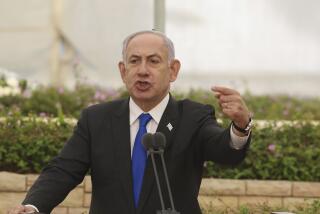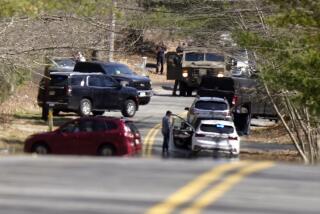U.S. Says Baghdad Hiding, Not Dismantling, Weapons
- Share via
NEW YORK — NEW YORK -- Deputy Defense Secretary Paul D. Wolfowitz on Thursday gave the clearest picture yet of why the White House believes that Iraqi President Saddam Hussein is committed to concealment -- not disarmament -- and that he won’t be disarmed without force.
Wolfowitz asserted that the U.S. has evidence that Baghdad is hiding weapons and documents from inspectors and threatening scientists and their families with death for cooperating with U.N. officials, and that Iraqi intelligence officers are posing as scientists to be interviewed by inspectors.
But he said that the White House cannot yet share that evidence, frustrating would-be U.S. allies in the campaign to disarm Iraq and failing to convince skeptical challengers that an immediate attack on the country is necessary.
“You need something more decisive than this general feeling that Iraq is not really cooperating,” a senior British official told The Times on Thursday. “For our point of view, we don’t have enough to go to war at this point.”
Wolfowitz’s comments, made to the Council on Foreign Relations in New York, were the latest in the White House’s carefully choreographed campaign to make its case this week before the chief U.N. weapons inspectors deliver their assessment Monday of Iraqi cooperation.
The remarks come at a time when key members of the U.N. Security Council -- France, Germany, Russia, China and now even the United States’ staunchest ally, Britain -- are insisting that the inspectors should have more time to try to disarm Iraq before resorting to force.
Wolfowitz’s hourlong presentation followed an elaborate argument Tuesday by Deputy Secretary of State Richard L. Armitage, statements Monday by Secretary of State Colin L. Powell at the United Nations, and a series of talk-show appearances by Powell and National Security Advisor Condoleezza Rice last weekend.
Taking a Different Tack
Like the others, Wolfowitz laid out a familiar litany of missing weapons material, recited decades-old details of deception and Baghdad’s history of tricks.
But Wolfowitz, a former political science professor, also tried a slightly different tack. His speech contrasted the cooperative conversion of nuclear weapons programs in South Africa, Ukraine and Kazakhstan against what has not been happening in Iraq.
While those nations had entire divisions devoted to dismantling their weapons programs, he said, Iraq has departments dedicated to concealing them.
“If a government is unwilling to disarm itself, it is unreasonable to expect inspectors to do it for them. They cannot be charged with a search-and-destroy mission to uncover so-called smoking guns -- especially not if the host government is intent on hiding them and impeding the inspectors’ every move.”
If the Iraqis won’t disarm themselves, he concluded, the U.S. will do it for them.
That’s an action that Wolfowitz, one of the administration’s most influential hawks, has been advocating for almost as long as Hussein has been facing off with the U.N.
He had already focused on Hussein’s potential threat to the region a decade ago while he was in the first Bush administration. Under then-Defense Secretary Dick Cheney, Wolfowitz advocated a doctrine of preemptive action and a flexibility in foreign policy that would allow the U.S. to act independently when collective action couldn’t be orchestrated -- two keystones of present policy.
Wolfowitz began agitating for an invasion of Iraq shortly after the Sept. 11 attacks. In his speech Thursday, he tied the situation in Iraq to the war on terrorism, saying that if terrorist networks connect with rogue states possessing weapons of mass destruction, there would be a catastrophe of a “magnitude greater than Sept. 11.”
“Iraq’s weapons of mass terror and the terror networks to which the Iraqi regime are linked are not two separate threats, they are part of the same threat,” he said.
But he said the most persuasive bit of his speech -- “two rather stunning paragraphs” -- had to be cut out because they “would say too much about what we’re observing even today.”
The White House has not laid out its evidence more clearly because “Saddam Hussein must watch CNN,” he said.
Providing Assistance
But in what might be a close-mouthed administration’s most extensive description of U.S. intelligence support so far, Wolfowitz said Washington is providing weapons inspectors with “names of individuals whom we believe it would be productive to interview,” giving information about suspected sites of hidden weapons and helping the inspectors to thwart Iraqi infiltration of their operations.
He cited “reports” that Iraqi intelligence agents were posing as weapons experts to be interviewed by inspectors, who are empowered to offer asylum in return for helpful information. So far, no scientist has agreed to private interviews. “We know from multiple sources that Saddam has ordered that any scientists who cooperate during interviews will be killed, as well as their families,” he said.
Acting on U.S. intelligence tips, inspectors visited the homes of two nuclear scientists last week and copied a box of documents found in one house about Iraq’s uranium-enrichment programs.
He said that the U.S. has evidence that Iraq is moving documents and weapons material around “in a shell game” one step ahead of inspectors, and hiding them not only in homes but also in universities and farms, beneath mosques and hospitals, and even in lakes and rivers.
The United States has also “suggested an inspection strategy and tactics,” he said, and provided U2 spy planes and drone Predator aircraft.
Iraq so far has blocked U2 flights and claims to have shot down two Predators.
Wolfowitz cautioned that U.S. intelligence is “extraordinary” but not “omniscient.” But intelligence experts have gathered enough information to decide that Baghdad is not intent on disarming on its own, he said, asserting that the longer the U.N. waits to take action, the more likely Hussein is to use his hidden weapons.
“We’re at a point of real decision,” he said, “and if we lost that point, the credibility not only of the United States but of the entire world body is going to go down the tubes.”
*
Times staff writer Ronald Brownstein in Washington contributed to this report.
More to Read
Sign up for Essential California
The most important California stories and recommendations in your inbox every morning.
You may occasionally receive promotional content from the Los Angeles Times.












